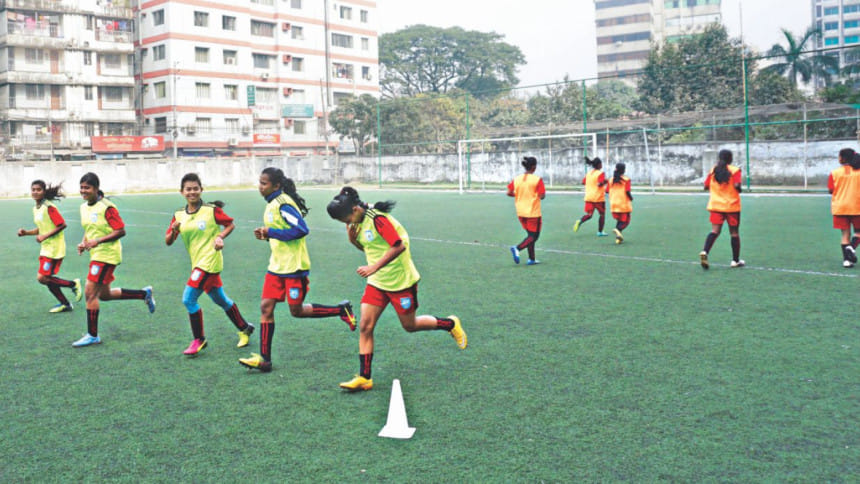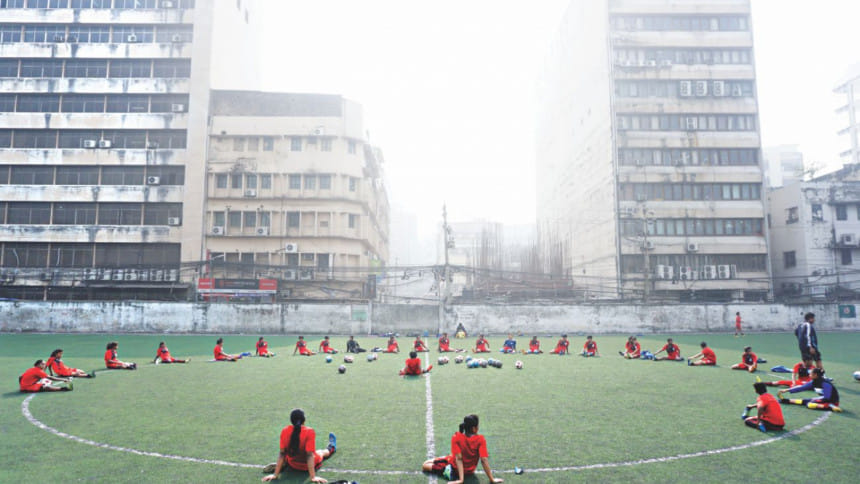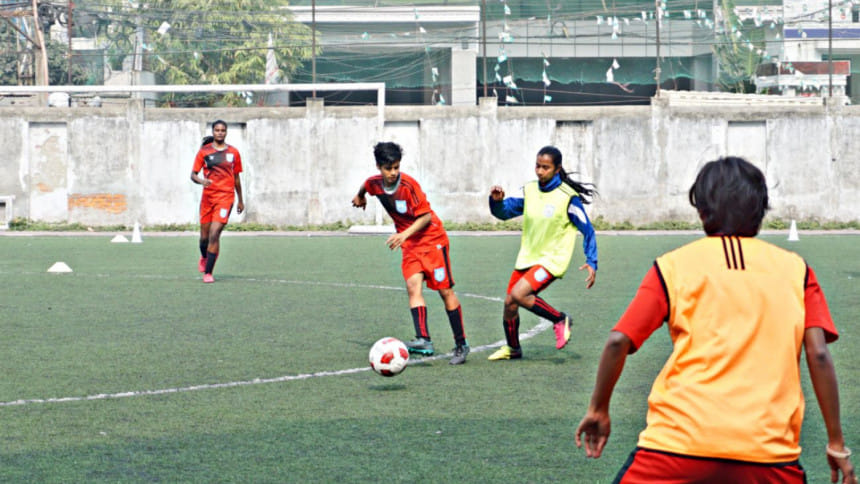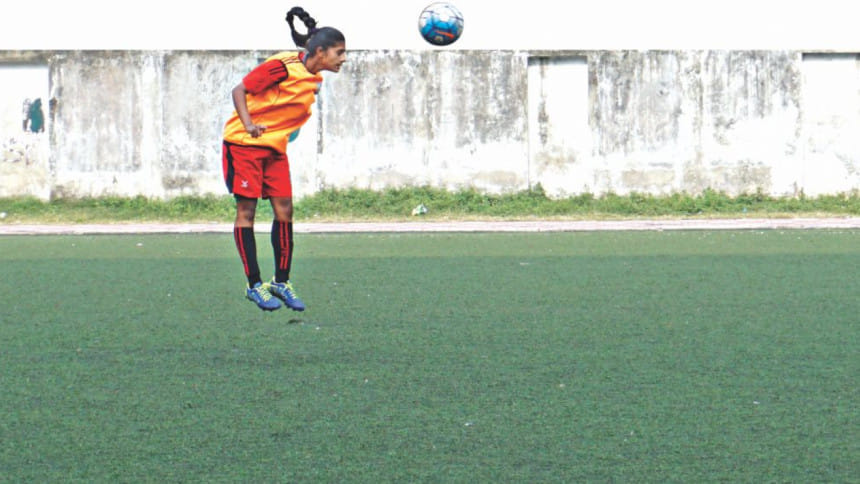Setting Their Goals High

Women's participation in sports is often thought to be less appreciated by our community since athletics are largely male-dominated and characterised by masculine qualities such as competition, aggression, and strength. Women still face many challenges when pursuing their athletic dreams, which are fundamentally due to long-standing gender norms established long ago. Despite these deeply embedded societal categories, more women are challenging these norms by competing and succeeding in a variety of sports. Among these, one group that has achieved great success most recently is the Bangladesh Women's National U-15 Football Team.
As they are excelling at a sport that is traditionally very 'male', in terms of it being a rough and tumble contact sport, these Bangladeshi girls are affecting the way our community views female athletes.
The girls made the nation proud as they won the inaugural edition of the SAFF U-15 Women's Championship with a solitary goal victory over India in December 2017. This is the first South Asian title for Bangladesh in women's football. The girls earlier won against India in a league state match. They also won the AFC U-14 Girls' Regional Championship in both 2015 and 2016.

Bangladesh started off the SAFF U-15 tournament by defeating Nepal in the opening match, and beating Bhutan in the second match. The girls finished as the unbeaten champion, scoring thirteen goals and conceding none throughout the tournament. This triumph was an especially significant one for the girls as they had vowed to win the title for their good friend and teammate, Sabina Yeasmin, who breathed her last in September 2017. While we celebrate the memorable accomplishments of these young women, here is a look at the stories of their journey.
Most of these girls belong to underprivileged families of remote villages. Many players also come from ethnic minorities of the country.
We often see that the capabilities of most underprivileged children in this country are suppressed rather than encouraged, as hundreds of thousands of them are married off, made to do household chores, or subjected to child labour to bring earnings for their families. But these girls took a different path - they were determined to chase their dreams and set their goals high. However, on the path of becoming national footballers, these girls had to overcome many challenges from family oppositions to societal pressures.

One such determined player whose family and neighbours gave her a tough time at first is Nilufa Yeasmin Nila from Kushtia. An SSC candidate for this year from Chand Sultana Maddhomik Balika Biddalay, Nila started playing football when she was in the fifth grade. “I used to play football with my school friends. My mother and neighbours viewed me as just a child enjoying a game and did not think I would take it up seriously,” says Nila. So, when the time came for Nila to really start training for the game, her family did not want her to leave. It was Nila's maternal grandmother who wanted to see her progress in the game, convinced others to let her play, and encouraged her the most. Nila developed her interest further from watching and observing football on television.
She was handpicked by Golam Rabbani Choton, the girls' football team coach during a match in Kushtia. Her skills and drive eventually earned her national focus. Nila plays as a left full-back defender for the U-15 team. A large portion of these players are frequent squad members of different youth national teams.
By the same token, versatile defender Akhi Khatun also had to hear negative remarks from many people back in her hometown, Sirajganj. Her neighbours thought it was pointless for a girl to play football. But fortunately, she was completely supported by her loved ones. “One vital factor is that I have always had my whole family and close friends supporting me from the beginning. I started playing football in the third grade in 2012,” says Akhi, who now studies at BKSP School and College. She got her start at the 2013 Bangamata Gold Cup, a nationwide girls' football tournament. She was called up for the national team after the 2013 Plan Under-15 tournament, which involved fifty districts and was held at seven venues across the country. The Bangladesh Football Federation (BFF) aimed to arrange awareness programmes and develop leadership skills for the girls with this tournament's procedure.
The obstacles these young girls had to face show how central and important of a role having the support of family and friends plays in influencing sports performance. The families and well-wishers of Nila and Akhi, despite how negatively people around them spoke about girls playing football, eventually enhanced their confidence by facilitating their involvement in the sport, and providing them with emotional support. Both Nila and Akhi want to improve their skills, succeed as footballers, and see the team move forward in the coming years.
Participation in sports traditionally regarded as masculine, including football, are deemed inappropriate for women. Instead, women are encouraged to engage in activities such as household chores and home-making, since these are seen as more feminine, and therefore met with less criticism. Maria Manda, the SAFF U-15 captain, explains that people around her had problems with her appearance in the football field. “The football kit consists of jerseys, socks, and shorts – Girls playing a sport in shorts was unacceptable. People said only boys can do that,” she says. The girls at first wore jerseys over the kameez, and then as their love for football grew, began wearing shorts. Maria is from Kalsindur, a village far away from Dhaka, more than a two-and-a-half-hour drive from Mymensingh. She was coached and mentored by primary teacher Mofiz Uddin in the beginning. Maria, who is the third child in her family, first started football in 2011, playing for the Kalsindur Government Primary School in the Bangamata Gold Cup. 11 of the girls currently training under the BFF women's wing came from Kalsindur Government Primary School. Maria and many other girls played football after school, where one class competed against another. In this way, their coach selected 20-30 girls and started holding practice sessions. These girls had no team manager or professional training at the time. Yet, they refused to stop, and carried on playing the game they love. As time went by, coaching facilities in the village improved, and Maria got her start at the Plan Under-15 tournament. “Our coach wants us to never become discouraged by negative comments. He believed that when we play well and prove people who criticised us wrong, they will applaud us, which they do now,” says the captain, whois preparing to sit for her SSC exams this year. Moving forward, Maria aspires to become even better and play in the leagues.

Another young woman who carried on playing the game she loves despite the defined gender roles around her is midfielder Monika Chakma from Rangamaati. “The boys in my school played football. It looked fun, so I would join in,” says Monika, who loved football from as long as she can remember. An ardent follower of Lionel Messi, Monika played in the Bangamata Gold Cupin 2011, and earned national attention after the Plan Under-15 tournament. She is an SSC candidate for this year from Ghagra High School. Initially, her father did not let her play. Coach Choton, whom Monika describes as a major source of encouragement for her, eventually made her family see the merits of playing football.
Preparing for and joining the field of football was no easy feat for these girls. The BFF women's wing regularly organises matches within age-groups, keeping them under training. They follow a strict routine, with practice sessions multiple times a day, maintaining a nutritious diet, and a tutor coming in to help them with their studies. They like to watch television and play carom together in their spare time, and just contact their friends and family once a week. Joining the team has given these girls a sense of belonging and camaraderie, and the opportunity to make new friends. “Even though I miss my friends and family back home, I have fun and feel at home with my teammates here,” says Akhi.

Education plays a vital role in their lives, as they all wish to be active members of society and participate in the ongoing changes and developments. However, football impacts the lifestyles of these young women, due to them having to train and play matches and tournaments in different countries, which involves plenty of time and traveling. “Playing has always been my main priority, but I don't let it affect my other priorities. This has positively forced me to become much more organised so I can maintain both my studies and football very well,” Nila states, when asked about the adjustments she had to make. So, these girls are not just hard-working and determined on the playing field, but in their academics as well.
Excited for the future of women's football, these young women hope that more people view them as footballers who can inspire their daughters to play sports and be role models to them.
“Now, girls in my village and surrounding areas who have the potential to play football well are gaining support from their families, because our hard work has encouraged them and they see us as positive representations,” says Maria.

 For all latest news, follow The Daily Star's Google News channel.
For all latest news, follow The Daily Star's Google News channel. 



Comments